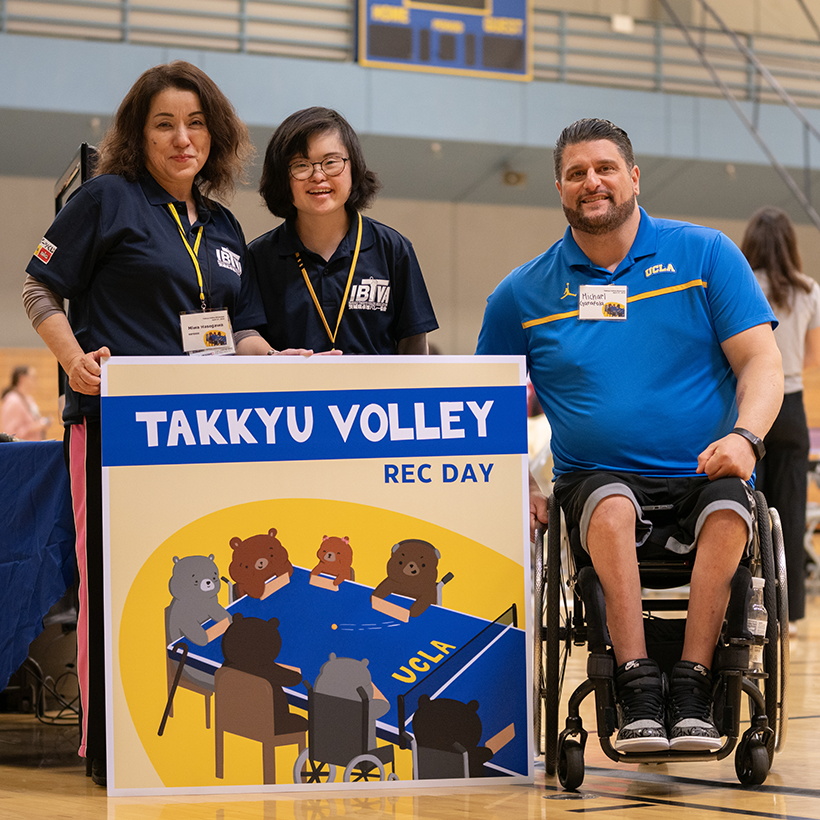
On Tuesday, October 8th, 2024, UCLA’s Disability Studies Sports and Society Lab hosted an event to commemorate the 100-year anniversary of the Deaflympics, an international multi-sport event that showcases the talents and achievements of Deaf athletes from countries around the world. The event had approximately 80 attendees, including members of the Deaf community spanning from the Inland Empire to the Central Valley.
The evening began with a warm welcome from Dr. Fred Ariel Hernandez, followed by remarks from the Dean of the Division of Undergraduate Education, Dr. Adriana Galvan, who expressed pride in UCLA’s pioneering role as the first institution to offer a Disability Studies major. Dean Galvan highlighted the importance of the Sports and Society Inclusion Lab, which aims to foster connections between academia and the community by exploring how sports can be more inclusive for people with disabilities.
The lecture was delivered by Dr. Donalda Ammons, who served as President of the International Committee of Sports for the Deaf (ICSD) from 2003-2009. Dr. Ammons captivated the audience with her narrative on the Deaflympics’ evolution since its founding in 1924 as the “International Silent Games” to its modern identity as the Deaflympics (1). She detailed the struggle for institutional recognition and autonomy, explaining how the Deaflympics fought to be distinct from the Paralympics. Despite its long history, it was not until 2001 that the Deaflympics was officially recognized under its current name by the International Olympic Committee (IOC) (1).
Dr. Ammons reiterated the challenge of balancing inclusion and independence. She emphasized that while the Deaflympics share some commonalities with the Paralympics, the needs and experiences of Deaf athletes are distinct, particularly regarding communication. The logistics of integrating Deaf athletes into the Paralympics would require extensive resources, such as the presence of professional interpreters for every participant. The estimated cost of $5 million for interpreters alone was deemed unfeasible by the Paralympic Committee, which ultimately led to the Deaflympics maintaining its independent status (1).
Dr. Ammons also shared anecdotes from her time leading the ICSD, mentioning the technological advancements and adaptations made over the years to ensure equitable competition for Deaf athletes. From innovative light-based starting systems to visual cues in various sports, the Deaflympics has championed accessibility, which has since been adopted by various sports organizations, including the National Collegiate Athletics Association (NCAA).
As the 2024-25 Disability Studies Ambassador, I assisted in the planning and execution of the event. As a Child of Deaf Adults (CODA) and Disability Studies student, I was very excited to see members of the Deaf community come together and bond over their shared experiences with the Deaflympics, and reminisce about their time at Gallaudet University. It was incredible to see how quickly everyone got along, both Deaf and hearing, and connected over their love for ASL and the Deaf community. This is the reason I wanted to pursue Disability Studies in the first place. I sought opportunities to learn more about how individuals who are constantly faced with barriers are able to persevere and overcome obstacles, using their creativity to rewrite the narrative and innovate accessible alternatives, just like Donalda said. Being here tonight, surrounded by individuals who were so enthusiastic about learning more about the Deaf community, warmed my heart. It reaffirmed my belief that I am in the right place, and that Disability Studies at UCLA is genuinely focused on redefining what access, inclusion, communication, and equality truly mean.
The event concluded with a Q&A session moderated by Benjamin Lewis, an ASL professor here at UCLA, where Dr. Ammons answered questions about her favorite Deaflympic moments, the growth of the Deaflympics, and the future challenges and opportunities for Deaf athletes worldwide. The evening served not only as a celebration of a century of Deaf athletic achievements but also as a powerful reminder of the ongoing efforts needed to promote inclusivity and independence within the global sports community.





